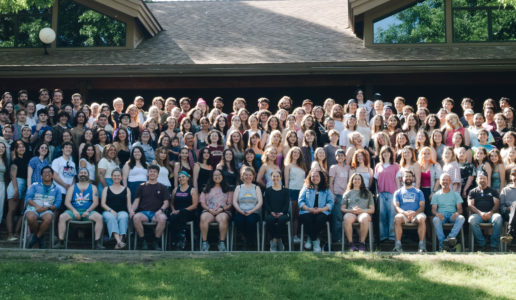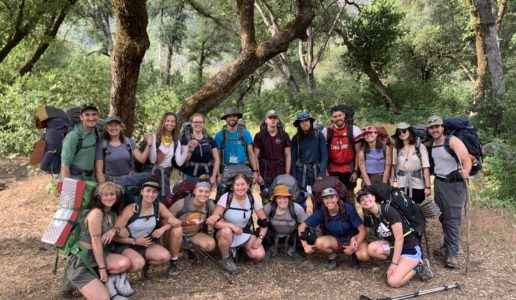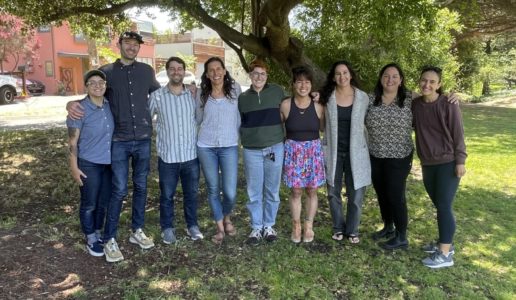Honoring the Eruv
By: Leora Cockrell
Leora Cockrell just completed a year-long Fellowship at Camp Tawonga sponsored by JOFEE (Jewish Outdoor Food, Farming and Environmental Education)
It’s well known among Tawonga staff that something changes about campers when they enter the Farm and Garden. Even the most high-energy bunk will become calm and more attentive when they pass through the Garden gate or into the farm animal pen. I think campers can sense that they are entering a space where they have to be more aware of themselves and their impact; plants can get trampled if they don’t look where they step, and animals can get spooked if campers move or talk too fast or loud. The act of entering these spaces serves as a beautiful metaphor for Shomrei Adamah – serving as keepers of the earth and remaining conscious of our relationships with the world around us.
The Garden is nestled in its own sunny, fertile niche within the Tawonga ecosystem, with willows to the East, the lower meadow to the South, the lake to the North and the mountain to the West. Surrounding the Garden is a fence that we lovingly call the eruv, or sacred boundary. When I first arrived at Camp for my six-month stay caring for the land, I walked the eruv and gave thanks for all the Garden has grown and will grow for the Tawonga community. As I circled the space, I remembered the words of one of the Garden alumna: “The Garden likes being here, it wants to grow things, you can tell.”
When campers visit the Farm or Garden, the first thing we do is orient ourselves to the space. I ask them what acting respectfully looks like in the space, and they answer expertly: walking on pathways, talking softly, asking before harvesting food. We also talk about what it means to give back to the Farm and Garden and Camp community through Tikkun Olam – repairing the world – and how we can give back in our lives down the mountain. Campers do chores like weeding, making compost, saving seeds, mulching pathways and feeding the bunnies fresh garden greens. They love a project in which they can play an important role and see the results of their efforts. I regularly witness amazing teamwork in the Garden as the bunk works together to solve problems and share resources.
By far, the campers’ favorite blocks in the Garden involve food, and the Teva (nature) staff makes sure to weave in lessons about taking care of our bodies, ensuring others have food, striving for sustainability in our food system and appreciating all that it takes to grow food. All of these concepts are a part of Jewish values from shmirat ha-guf (guarding the body), pe’ah (leaving 10% of your harvest for those in need), shmita year (forgiving debts and letting the land rest), or brachot (blessings of appreciation). Campers get to taste and cook food in the Garden that they’ve played a role in creating while learning about having a positive role in the world.
The Garden also plays a role to elevate Shabbat at Camp, including the opportunity to harvest food and flowers for the special Shabbas meal. Every Shabbat, a bunk harvests food for the entire Camp, and we enjoy these ingredients in our salads and adorn the tables with fresh cut flowers.
Later in the season, during weekend programs, families get an opportunity to visit the Garden, harvest crops and make quick pickles, walk the rows of flowers and vegetables and take food home at the end of the season. During the Staff Alumni Spring Service Weekend in March, we planted 20 fruit trees during a blizzard and reforested a space near the Garden with 30 native trees.
Before leaving camp in mid October, I walked the eruv once more. As I walked slowly, I pictured a time lapse from seedlings to overgrown chard, intermingling tomatoes, and 15 foot tall sunflowers. I saw campers picking and eating food, the Teen Leadership Institute teens expanding the fence line, and counselors breathing a sigh of relief as their bunk calmed upon entering the Garden gate. I gave my gratitude and wished the Garden a restful, replenishing winter.
Leora Cockrell is a graduate of Sustainable Agriculture and Food Systems, with a minor in Women and Gender Studies from the University of California, Davis. Leora was raised on 12 acres in the Sierra foothills in a house built by her parents where she started a small market garden with her father. She is passionate about reconnecting people with diasporic and colonial lineages to the land where they live now, with respect to indigenous people, without appropriating indigenous culture. Leora’s favorite river spots are the South Fork of the American and the Tuolumne that runs through Tawonga.
Leora is excited to be staying on for a second season in 2018 as the Farm and Garden Supervisor and to learn from the land for another year.



